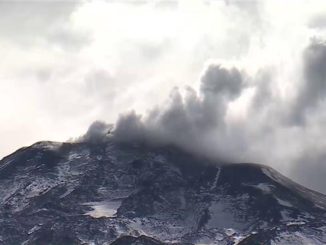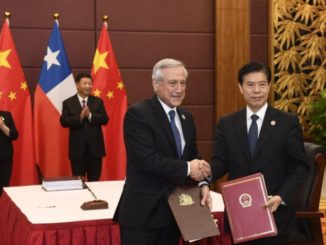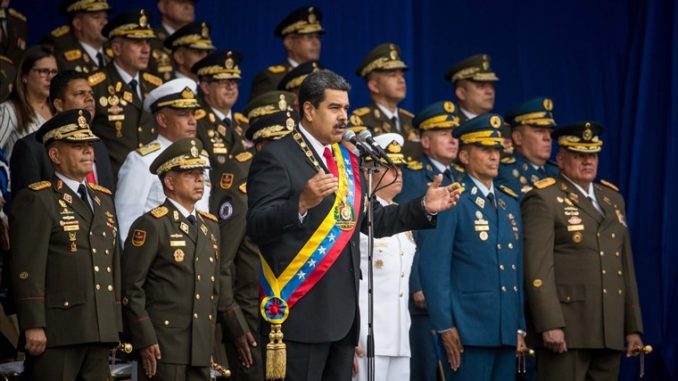
CARACAS – Venezuelan president Nicolás Maduro has survived an apparent assassination attempt in which he was targeted by drones armed with explosives while delivering a live TV address.
The attack happened here during a speech given by Maduro to commemorate the 81st anniversary of the country’s National Guard when the drones exploded near Maduro and his wife.
Another angle of the failed “drone bomb attack” on Nicolás Maduro this evening shows soft armour looking shields being hurriedly brought in front of Maduro for protection. pic.twitter.com/5ICfU5LYKR
— Jake Hanrahan (@Jake_Hanrahan) August 5, 2018
The live television transmission was then abruptly cut at 5:46 p.m. local time (2146 GMT).
In Sunday evening’s broadcast, Maduro can be seen giving an impassioned speech to hundreds of soldiers, before the sound of an explosion causes him and wife Cilia Flores to flinch and look up to the sky. Speaking afterwards Maduro, who was quickly ushered away by bodyguards, said: ‘This was an attempt to kill me.’
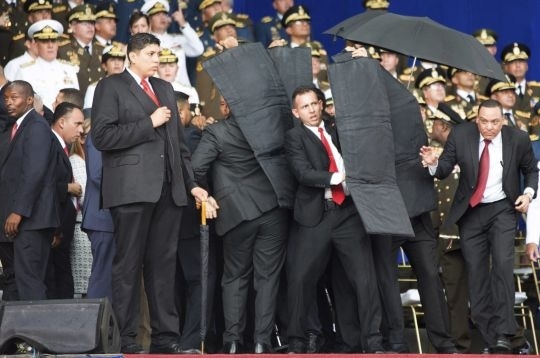
Within seconds, a second explosion was heard and pandemonium ensued, with the assembled soldiers scattering and Maduro guided to safety by his security staff. Maduro has blamed the ‘far right’ – working in co-ordination with detractors in Bogota and Miami, including Colombian President Juan Manuel Santo and conspirators in the United States – for the attack.
Seven National Guard soldiers were injured and rushed to hospital, but the president was not hurt, according to Minister of Communication Jorge Rodriguez.
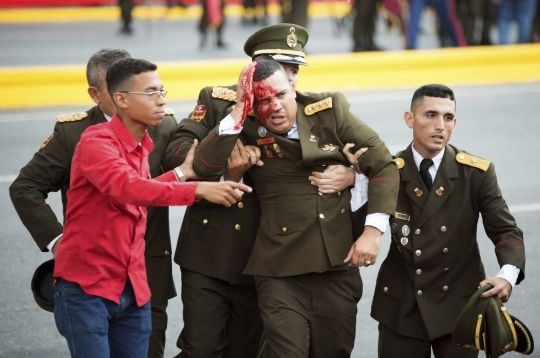
Some of the ‘material authors’ of the apparent assassination attempt have been detained, the Venezuelan government has said.
Venezuela-Colombia relationship has been long strained by frictions between the two neighbouring South American countries, including border disputes and military concerns.
Maduro said in June that Venezuela’s opposition camp “has the backing of a handful of traitors there in Bogota (the capital of Colombia),” adding that his country was “besieged by the northern empire” — the United States.
However, Colombian Foreign Ministry on Sunday refuted Maduro’s accusation, saying in a statement that “the claims that the Colombian leader could be responsible for a supposed assassination of the Venezuelan president sound absurd and lack basis.”
“I pledge to do justice,” Maduro wrote in his twitter following the attack, adding that he is “more determined than ever” to “consolidate peace, tranquility, development and prosperity.”
Finalizando el hermoso acto de lealtad de nuestra heroica @GNBoficial, intentaron asesinarme. Gracias al escudo protector del pueblo y la bendición de Dios he salido ileso y me encuentro de pie y victorioso. Listo para seguir en batalla por la paz y la tranquilidad de Venezuela. pic.twitter.com/lmsv0IB7Rk
— Nicolás Maduro (@NicolasMaduro) August 5, 2018
The country’s right-wing opposition groups have launched waves of protests in recent years designed to pressure the government to hold early presidential elections in a bid to oust Maduro, who took office in 2013 and now faces criticism for the flagging domestic economy.
Oil-producing Venezuela has been struggling with an acute economic crisis since crude oil prices crashed in the international market, affecting state coffers and government-run services, including electricity and water.
Chile doesn’t recognize Maduro’s victory in Venezuela, says Piñera


